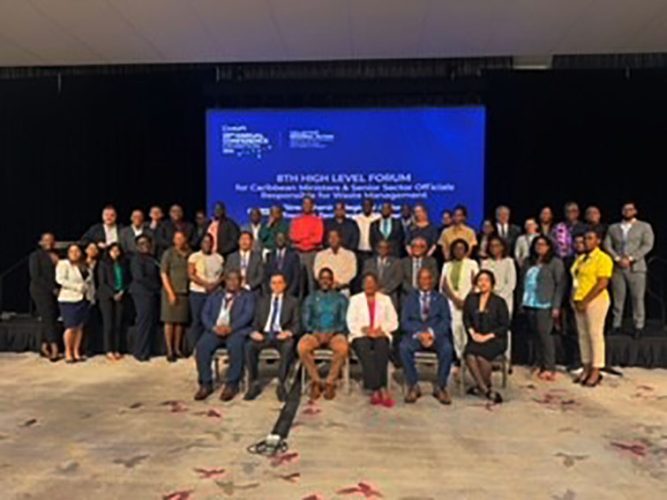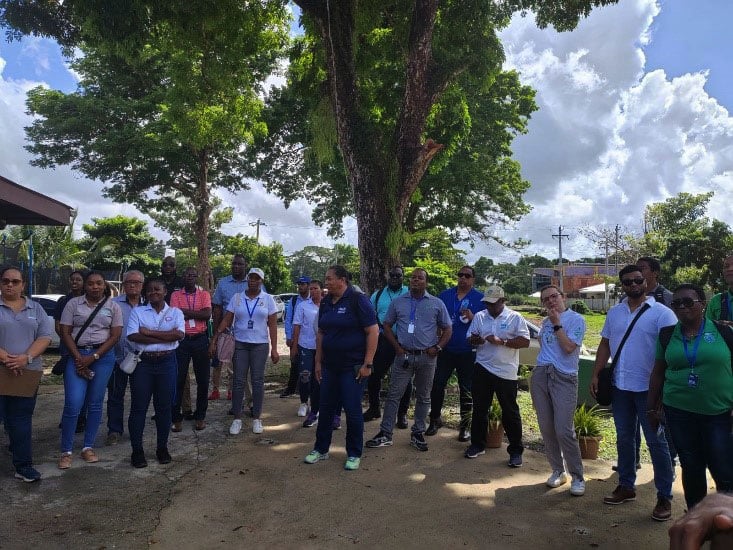As part of regional efforts to move towards achieving a zero-waste Caribbean while coming up with solutions to drive the circular economy, Caribbean ministers of government and senior officials in the sector, wrapped up their 8th High-Level Forum (HLF) held under the theme, “Strengthening Regional Action Toward a Zero Waste Caribbean.”
A release yesterday from the United Nations Environment Programme (UNEP) explained that the forum served as a platform for critical discussions on financing circular economy solutions, regional collaboration, and private sector engagement in waste management. Key sessions addressed sustainable financing, private sector involvement, and innovative solutions to drive the circular economy and reduce waste generation across the region.
The event was organised by the Caribbean Water and Wastewater Association (CWWA), the United Nations Environment Programme (UNEP), the Ministry of Public Utilities of Trinidad and Tobago, the Caribbean Development Bank (CDB), the Inter-American Development Bank (IDB), and the World Bank.

It gathered some 50 participants including Minister of Public Utilities of Trinidad and Tobago, Marvin Gonzales; Minister of Planning and Development of Trinidad and Tobago, Penelope Beckles; Minister of State in the Ministry of Sustainable Development and Climate Change, Belize, Ramon Cervantes; Minister of Health and Social Development, British Virgin Islands, Vincent Wheatley; Minister of Local Government and Regional Development, Guyana, Anand Persaud, senior officials, development partners, and private sector representatives from across the Caribbean to engage in strategic discussions on advancing sustainable waste management practices incorporating circular economy principles.
This forum was supported by the European Union-funded Zero Waste in the Caribbean: New Ways New Waves Project, cofinanced by the German Government. Since 2022, this initiative aims to foster regional cooperation in partnership with CARIFORUM and support innovative solutions to waste management challenges.
Gonzales, spoke of the challenges of waste disposal faced by his country. “The country’s waste management challenge is the generation of over 700,000 tons of waste annually, with two-thirds of landfills exceeding capacity. The need for behavioral change, updated policies, and better infrastructure, particularly for e-waste management is fundamental.”
He however expressed confidence in new initiatives, such as the Trinidad Cement Limited – Solid Waste Management Company Limited Memorandum of Understanding, which aims to address these challenges and drive reduction of waste disposal.
 Meanwhile, in his opening address, President of the Caribbean Water and Wastewater Association (CWWA), Marlon Daniels, provided background on the pivotal 2017 decision to adopt waste management as the third pillar of CWWA’s mission. He reiterated the Association’s pledge to continue supporting capacity-building efforts and fostering partnerships to strengthen waste management across the Caribbean.
Meanwhile, in his opening address, President of the Caribbean Water and Wastewater Association (CWWA), Marlon Daniels, provided background on the pivotal 2017 decision to adopt waste management as the third pillar of CWWA’s mission. He reiterated the Association’s pledge to continue supporting capacity-building efforts and fostering partnerships to strengthen waste management across the Caribbean.
And Head of the Caribbean Sub-Regional Office at UNEP, Vincent Sweeney, highlighted the alarming growth in waste generation in the region. “With 320,000 tons of plastic impacting the marine environment, it is necessary to strengthen national frameworks and capacity-building efforts to transition from concept to implementation in waste management.”
According to the release, throughout the forum, regional case studies were presented to showcase the best practices and innovative solutions in waste management and circular economy initiatives. Grenada shared insights on rehabilitating its Perseverance landfill site and the importance of waste diversion efforts, while the British Virgin Islands discussed the challenges posed by small island size and waste disposal constraints. Other Caribbean nations, including Saint Lucia and Barbados, also shared successful initiatives aimed at reducing waste and promoting recycling efforts.
A key moment during the forum was the signing of the “Declaration of Port of Spain 2024 on Regional Action towards Zero Waste”, which outlines the region’s shared commitment to adopting circular economy principles, improving waste management policies, and mobilising financial resources to support both national and regional goals.
The declaration also highlights the importance of digital transformation and enhanced data management systems to track and improve waste management processes.
The forum also recommended the establishment of regional working groups to advance waste management which include circular economy principles, alongside the creation of a Regional Community of Practice to foster continued engagement, knowledge sharing, and the dissemination of best practices across the Caribbean.
Accreditation
Division Chief (Ag.) of the Economic Infrastructure Division at the Caribbean Development Bank (CDB), William Ashby, underscored the increase in CDB’s accreditation to the Green Climate Fund from US$50 million to US$250 million, providing a significant platform for the design and implementation of regional waste management projects. Meanwhile, Division Chief of Water and Sanitation at the Inter-American Development Bank (IDB), Sergio Campos, emphasised the need to engage the younger generation and foster collaboration between producers and consumers to drive the circular economy forward.
Beckles acknowledged Trinidad and Tobago’s commitment to a Zero Waste Caribbean and reiterated the importance of the Revised Framework for the Management of Municipal Solid Waste. She expressed gratitude to the CWWA and all partners for their efforts toward solid waste management in the Region.
In addition to meaningful discussions the participants also joined a session on structuring and implementing a deposit return system in the Caribbean including experiences in Barbados, Saint Lucia, and Trinidad and Tobago, and field visits took place to local recycling facilities and local industry initiatives producing plastic lumber.
Looking ahead, the forum will facilitate enhanced collaboration throughout the Caribbean, reinforcing the region’s dedication to sustainable waste management and circular economy practices. This shared commitment aligns with the global Sustainable Development Goals (SDGs) and positions the Caribbean as a leader in regional waste management transformation.
The Zero Waste in the Caribbean project is funded by the European Union, in collaboration with CARIFORUM, co-financed by the German Cooperation and implemented by AFD, GIZ and UNEP, in partnership with the OECS, the release added.






